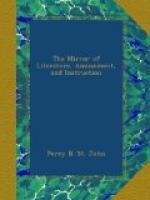Before I close these observations, let me add, that in looking at this question, we must consent to throw off our national prejudices; and in drawing the comparison, not to regard English plays, whether tragic or comic, as the standards of perfection. English Comedy is not only considered inferior to that of most nations, but it is in many respects bad in its tendency, and may almost be looked upon as a school for vanity. To conclude, instead of regarding the drama as it is, I have rather endeavoured to consider it as it should be.
F.
* * * * *
THE PUBLIC JOURNALS.
* * * * *
REAL CHARACTER OF LOUIS XIV.
Concerning Louis the Fourteenth himself, the world seems at last to have formed a correct judgment. He was not a great general; he was not a great statesman; but he was, in one sense of the words, a great king. Never was there so consummate a master of what our James the First would have called king-craft,—of all those arts which most advantageously display the merits of a prince, and most completely hide his defects. Though his internal administration was bad,—though the military triumphs which gave splendour to the early part of his reign were not achieved by himself,—though his later years were crowded with defeats and humiliations,—though he was so ignorant that he scarcely understood the Latin of his mass-book,—though he fell under the control of a cunning Jesuit and of a more cunning old woman,—he succeeded in passing himself off on his people as a being above humanity. And this is the more extraordinary, because he did not seclude himself from the public gaze like those Oriental despots whose faces are never seen, and whose very names it is a crime to pronounce lightly. It has been said that no man is a hero to his valet;—and all the world saw as much of Louis the Fourteenth




